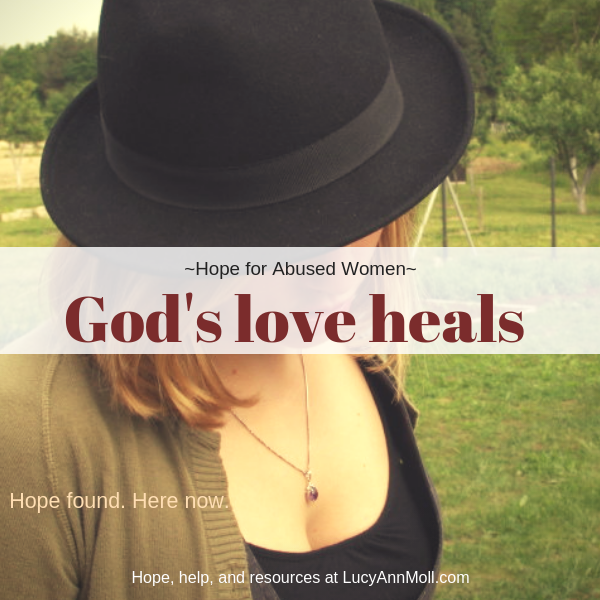
by Lucy | Oct 2, 2018 | biblical counseling, emotions, relationships
Truly embracing God’s love for you — especially if you’ve experienced the horror of sexual abuse — is the way to hope and healing. Do you want healing too? Read Monica’s story and learn how gospel-centered counseling helped remove stumbling blocks to her faith. Consider biblical counseling for you or a loved one too.
This article by biblical counselor Shannon Kay McCoy, featured on Heart2Heart Counselor Directory here, appeared first at the Biblical Counseling Coalition website and is used with permisison.

Monica’s Story
At a young age, Monica was sexually abused by her step-father until he divorced her mother. In her teenage years she was raped by her brother’s friends.
She lived a life of promiscuity—getting pregnant twice with both ending in abortions. She was drinking alcohol heavily and using drugs until the age of 24 when she developed cervical cancer. God used her illness to get her attention.
Click & Tweet!
She became a Christian and met her husband, Jeff, at church. Only one year into the marriage, Monica began suffering from bouts of depression and self-loathing.
She was distancing herself from her husband but didn’t know why. You see, she thought as a Christian, she shouldn’t struggle with these issues. Finally she confided in a Christian friend who encouraged her to seek biblical counseling.
The Journey Begins
The counseling process helped Monica to discover some stumbling blocks to her faith. She had doubts about God—about His goodness, His grace, His love, and doubted ever being free from condemning thoughts. With the love and support of her husband, she began the difficult process of looking at her past through the lens of Scripture.
She was afraid to r eveal certain details to Jeff because she didn’t want him to stop loving her. He assured her of his love and commitment, so she forged ahead allowing God to peel away layer after layer into her past.
eveal certain details to Jeff because she didn’t want him to stop loving her. He assured her of his love and commitment, so she forged ahead allowing God to peel away layer after layer into her past.
During the most difficult layers of dealing with the sexual abuse, she had to distance herself from him intimately. After eighteen months of biblical processing, Monica was able to restore her relationship to her husband.
Believing Again in God’s Love
Through the counseling process, her faith had grown stronger. She believed in God’s goodness and grace. But she wasn’t so sure about His love.
She told the counselor that she still couldn’t understand how a holy God could love someone with her past. The counselor asked her,
How do you know that Jeff loves you, even after knowing of your past?
She thought about how Jeff had been very supportive throughout the counseling process. He had been incredibly gracious to her when she was at her worst with depression and self-loathing. During the time she separated herself from him intimately, he was amazingly patient and forgiving.
He wasn’t shocked nor disgusted when he learned of the sexual abuse. Instead, he was a safe and secure haven.
Her husband’s love encouraged her to share her heart with him. Knowing her ugly past, she was only met with Jeff’s unconditional love. In return, she loved him in a much deeper way. She would sacrifice her time and energy to please him.
And spending time with him was no longer a burden. She treasured every moment with him because she felt valued by his love.
Reclaiming Her Love for Her Husband
Monica kept growing in her relationship with God and her husband. Indeed, she no longer feared her husband’s love.
Click & Tweet!
To the question, “How do you know that Jeff loves you?” she answered this way. “I know Jeff loves me because he has demonstrated his love in marvelous ways.” The counselor asked Monica to read Romans 5:8, which states,
But God shows his love for us in that while we were still sinners, Christ died for us.
The counselor stated that God proved His love for her by sending His Son, Jesus, to die for her sins. And since she is a believer, there is no condemnation for those who are in Christ Jesus (Romans 8:1).
The counselor also reminded Monica that God’s love was lavished on her through Jeff’s love. Seeing how Jeff loved her with the love of God, she began to get the picture. She finally grasped a greater understanding of God’s love.
Monica also learned that God’s love for her is incredibly gracious and sacrificial, amazingly patient and forgiving, safe and secure, and completely accepting of her in spite of her past. She realized that Christ has given her a new identity—His identity. She was no longer a victim living in her past.
Click & Tweet!
God saw everything she did and yet still loved her. This realization gripped Monica deep into the core of her soul.
Motivated by Love to Love
God’s love granted Monica the grace to love Him. As she daily contemplated His love, she became more sensitive to affronting the One she loved which led quickly to repentance of sin. She also found it easier to pray. And she didn’t fear seeking His presence.
In addition, she wanted to spend time with God. She desired to please Him with her time and energy. She had a growing willingness to sacrifice her life for God’s glory—no longer doing things her way.
Monica learned as the Apostle Paul did, that “the love of Christ controls us” (2 Corinthians 5:14). Christ’s sacrificial, substitutionary death motivated Paul’s service for Him. In Galatians 2:20, Paul states,
I have been crucified with Christ. It is no longer I who live, but Christ who lives in me. And the life I now live in the flesh I live by faith in the Son of God, who loved me and gave himself for me.
Paul learned that he died to the Law because he was crucified with Christ. Therefore he was able to live for God because Christ lived in him.
The greatest love of all.
True love has a constraining virtue. Monica realized this in Jeff’s love for her. It cost him something to love her. He accepted the consequences of her past and chose to love her. She would do anything for him because he loved her at her worst.
Even greater is the love of Christ. It cost Him something to love us. He gave up His life when we were at our worst—and still loves us at our worst. By faith Monica embraced God’s love for her. In return, she loved God because He first loved her (1 John 4:19).
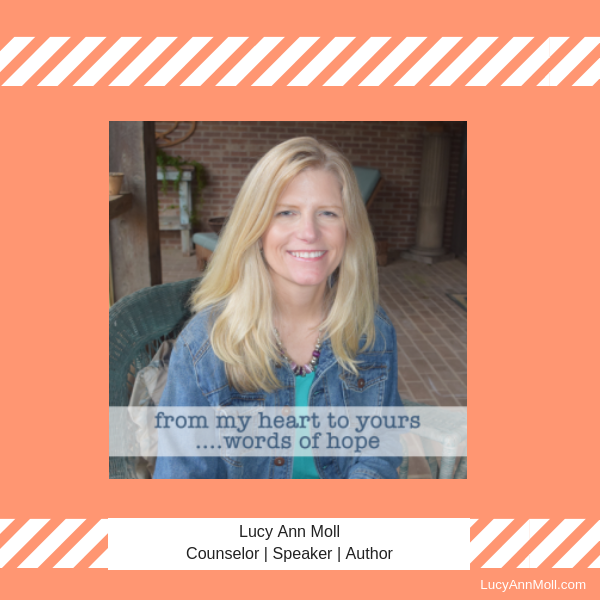
Join the Conversation
Think of a time when you felt really loved by someone. What effect did it have on you? How did you respond to that love? Now think of God’s love for you. What effect does His love have on you? How do you respond to His love?
Counseling Hearts to Hope,

by Lucy | Aug 22, 2017 | biblical counseling, book reviews, emotions, relationships |
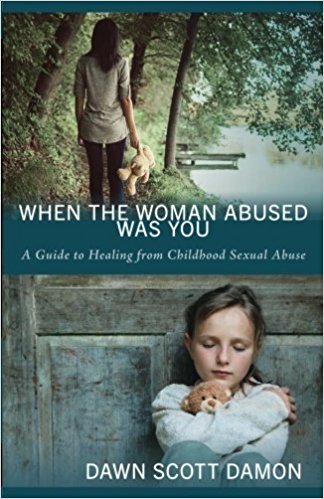 You have a choice to heal, even when you’ve faced childhood sex abuse, among the most awful experiences a woman can have. In this article by acclaimed author Dawn Scott Damon, you’ll discover potholes on the road to recovery.
You have a choice to heal, even when you’ve faced childhood sex abuse, among the most awful experiences a woman can have. In this article by acclaimed author Dawn Scott Damon, you’ll discover potholes on the road to recovery.
BONUS: BOOK GIVEAWAY! If you’d like to enter the giveaway for Dawn’s latest book, When the Woman Abused Was You, leave a comment at this blog post or contact me. Use the words, “I want Dawn’s book!” I’ll contact the winner through email by Friday. Thanks! –Lucy

Some women live for decades unaware of their abusive past. Others who were abused as children live in the shadows of shame, afraid to confront the monsters of the past. Still other women let their abuse define them.
But there is another choice: the choice to heal.
Click & Tweet!
The choice to heal can be difficult, yet it is the only choice that brings healing and new life.
So what things hold us back from making the choice to heal?
Potholes on the Road to Recovery
FEAR: We are afraid we will slip into an emotional “hole” and never get out again. Or we’re
afraid to give up our old coping mechanisms or to be seen as “weak.” Or we may fear going
crazy, losing a relationship, or facing the truth or allowing ourselves to feel. No matter the
fear, denial is destructive. Ignoring a wound only brings festering. Commit to honestly looking at your past and grieving your losses.
PRIDE: We’re unwilling to admit we have a problem. We’re not one of “them.” We don’t want to be identified as weak or a sexual abuse survivor. Everyone else has a problem. We default to
control and manipulation, and we are afraid to trust people.
NEGATIVE ATTITUDE: We develop a victim mindset. We stake a claim for what we believe we deserve and build a case for ourselves. But our attitude is our choice and the basis of self-control. We can refuse to think like a victim
by refuting “thought saboteurs.”
THOUGHT SABOTEURS:
anger, apathy, blame, criticism,
depression, dishonesty, fear, guardedness, hatred, indifference, intolerance, irresponsibility, jealousy, mistrust, pessimism, pride, resentment, revenge, sadness, self-pity, shame, skepticism, suspicion, and a victim mentality.
Self Evaluation
Are you struggling with pain from your past? With
childhood abuse? Is it time to take steps toward
healing? Pray through the areas above and ask God to help you
face your fears and recognize pride,
negative attitudes, and thought saboteurs. You’ve taken your first steps toward healing, and your life
will never be the same
You’ve carried scars long enough. It’s time to shed the layers of pain that hold you captive and find freedom and healing.
In When the Woman Abused Was You, author, pastor, and survivor Dawn Scott Damon openly shares from her own abuse experience and serves as a guide to help you make your way through the arduous healing journey. With raw and honest transparency, Dawn helps you take the necessary steps that will lead you to your own powerful breakthrough and personal healing encounter.
Experience new freedom you never thought possible. The journey may be difficult—even exhausting—but you’ll find reward and fulfillment as you transform into a confident, fulfilled, and overcoming woman.
“You’ve carried scars long enough. Its time to shed the layers of pain that hold you captive and find freedom and healing.” ~ Dawn Scott Damon
About Dawn
 Dawn Scott Damon is a pastor, speaker, and author whose most recent book, When the Woman Abused Was You, released in 2017 and is the second book in a series. Dawn’s first book in this series, When A Woman You Love Was Abused has touched thousands of lives – both men and women.
Dawn Scott Damon is a pastor, speaker, and author whose most recent book, When the Woman Abused Was You, released in 2017 and is the second book in a series. Dawn’s first book in this series, When A Woman You Love Was Abused has touched thousands of lives – both men and women.
Dawn worked closely with New York Times bestselling author Cecil Murphey (90 Minutes in Heaven, When A Man You Love Was Abused) and together they presented a conference, When Someone You Love Was Abused, Help for Those Suffering from Childhood Traumas, in Michigan and Georgia..
Dawn also writes a blog for women who have experienced trauma. It is named Freedom Girl Sisterhood at freedomgirlsisterhood.com.
Sharing Hope with Your Heart,

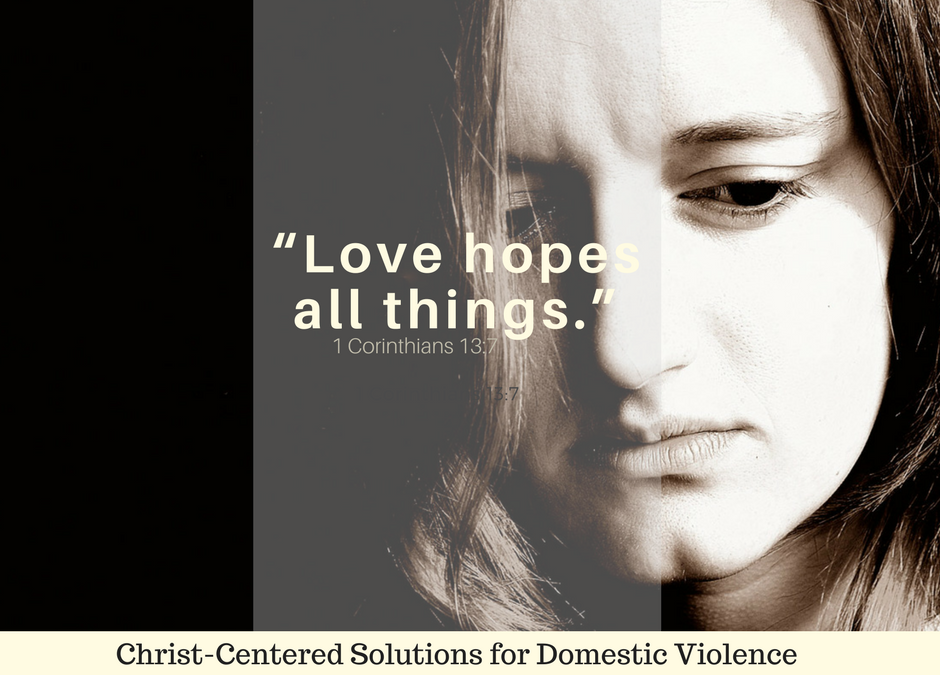
by Lucy | Jun 1, 2017 | biblical counseling, emotions, relationships
ABUSE and the abuser: Can an abuser change? Keep reading to find out if an abuser stop his abuse. And if so, how? In part 4 of this four-part series on abuse, biblical counselor Jim Newheiser evaluates common statements made about abuse. His article appeared first here at the Biblical Counseling Coalition and is used with permission. Read part 1, part 2, and part 3.

ASSERTION: There is nothing you can do to change an abuser.
Are Some Men So Stubborn to Ever Change?
A valid concern: This statement is making the point that there are some men who are so stubbornly sinful that no matter how nice you are to them, they will continue their angry abuse.
It is made to refute the false counsel some women have been given that if they simply could learn to be kinder and quieter, then their violent husbands would stop hurting them. However, Scripture does describe some men as violent, hard-hearted, and refusing to receive correction (Prov. 16:29; 29:1,22).
A man of wrath stirs up strife,
and one given to anger causes much transgression. Proverbs 29:22
The Bible Gives Hope to All, Even to an Abuser
The harm that can be caused: On the other hand some so-called experts have asserted that there is nothing a victim can do by changing her behavior to change the abuser and his behavior.
While I agree that in many cases it is true that changed behavior will have no effect on a wicked, hardened man, the Bible explicitly gives hope that the Lord can use the godly behavior of a victim to soften the heart of a sinful spouse. First Peter 3:1-2 says a disobedient or unsaved husband might be won by his wife’s treating him better than he deserves. Proverbs 15:1 tells us that a gentle answer may turn away wrath.
I know that these verses have been misused to wrongly send women back into dangerous situations. But it is also true that God can use the Christ-like behavior of a wife to reach an angry husband. Again, a distinction needs to be made based upon the degree of sinful anger (and the resultant danger), rather than quickly saying that a situation is hopeless and that the woman ought to give up and move on.
If there is any doubt as to whether a woman is in danger, I would encourage church leaders to err on the side of safety by helping her get away (hopefully temporarily). Then work with the husband to gauge true repentance before trying to restore the marriage and bring the couple back together again.
All Sinners Can Be Forgiven
It would be better to say: The gospel gives hope that sinners can be forgiven and transformed
Click & Tweet!
. Also, those in whose lives God has worked will show signs of true repentance (including patience).
Saul, the murderous persecutor, was transformed into the great apostle of grace. First Corinthians 6:9-11 tells how sinners of every kind have been cleansed and changed by the power of the gospel.
We believe that abusers who had been characterized by the wicked deeds of the flesh can become servants who bear the fruit of the Spirit. Abusers are often masters of manipulation (i.e., worldly sorrow).
Click & Tweet!
A truly repentant man will hate his sin more than its consequences; he will be more concerned about the rights and safety of others than about his own rights, and he will be patient as those whom he has previously hurt learn to trust him (see 2 Cor. 7:9-11).
(Friend, are you in a controlling, destructive, or difficult marriage? Why not get the help you need? Learn more about confidential, compassionate, effective biblical counseling by Skype or in person.
Contact me today.–Lucy)
Sharing Hope with Your Heart,

by Lucy | May 30, 2017 | biblical counseling, emotions, relationships
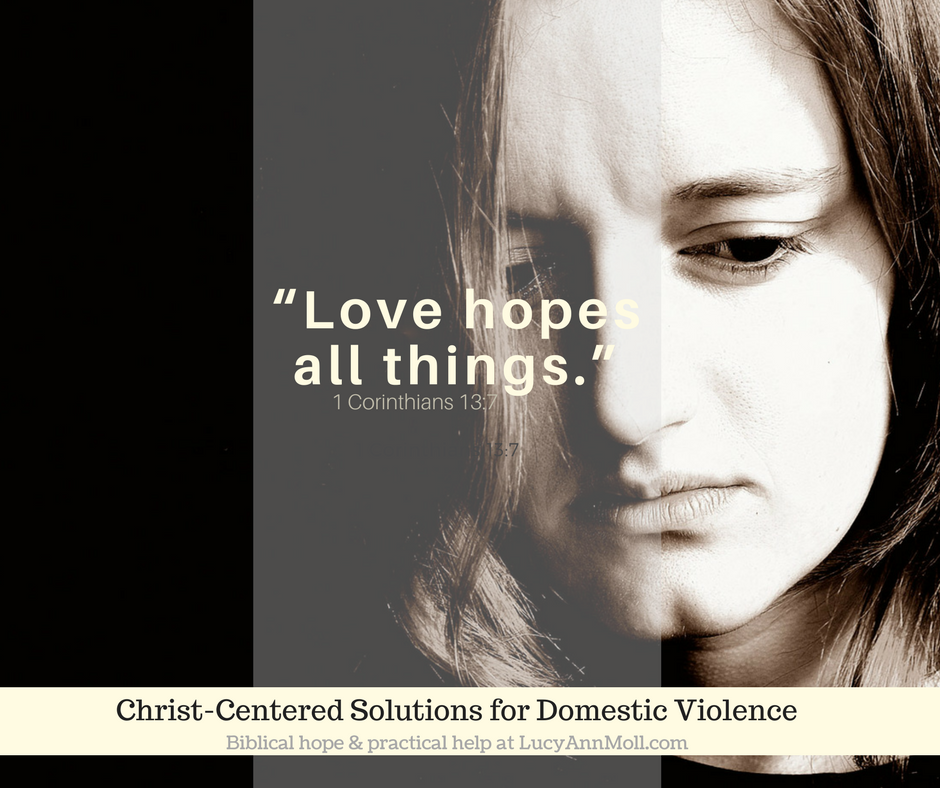 Abuse is patently wrong, but when should you leave the marriage or relationship? Keep reading to find out when — and if — you should leave. In part 3 of this four-part series on abuse, biblical counselor Jim Newheiser evaluates common statements made about abuse. His article appeared first here at the Biblical Counseling Coalition and is used with permission. Read part 1 and part 2.
Abuse is patently wrong, but when should you leave the marriage or relationship? Keep reading to find out when — and if — you should leave. In part 3 of this four-part series on abuse, biblical counselor Jim Newheiser evaluates common statements made about abuse. His article appeared first here at the Biblical Counseling Coalition and is used with permission. Read part 1 and part 2.

If You Feel You’re Being Mistreated, Should You Leave?
ASSERTION: If you feel that you are being mistreated or controlled, leave the relationship.
A valid concern: This statement is made because there are so many women who stay in dangerously abusive relationships when they have every right to seek safety and refuge.
Possible Harm of Believing the Assertion
The harm that can be caused: Those who are seeking to protect victims of abuse sometimes fail to distinguish between the degrees of sinful mistreatment that can take place in a marriage relationship.
The message some women get is that if your husband is to any extent controlling, manipulative, or angry, then you are in an abusive relationship and you need to get out. Women are told that an angry husband has broken the marriage covenant, and they have the right to divorce.
I affirm that a battered wife has every right to get away from a violent husband
Click & Tweet!
and that his failure to repent and to live at peace with her can eventually lead to the breakup of their marriage (1 Cor. 7:15). Sadly, however, I have seen women who are in difficult, but not violent marriages—in which there is often anger on both sides—who use the claim of abuse to divorce their husbands on less than biblical grounds.
The reality is that marriage brings together two sinners.
Click & Tweet!
Because of the fall, many marriages involve a struggle for control as described in Genesis 3:16. In many cases, both partners are guilty of sinful anger, which Jesus calls murderous (Matt. 5:21-22).
Wisely Investigating an Abuse Charge
It would be better to say: Wisdom needs to be exercised in distinguishing between degrees of sin in an allegedly abusive situation.
Just as the act of adultery is a greater threat to a marriage than a lustful look (Matt. 5:27-28), there is a difference between physical assault and a harsh word. Because Jesus declared, “What therefore God has joined together, let no man separate” (Matt. 19:6b), every effort should be made to preserve marriages and to help both men and women who have fallen short of perfectly keeping the marriage covenant to change.
Church leaders shouldn’t swing from the extreme of sending women back to abusive situations to the other extreme of encouraging the breakup of marriages which might be restored
Click & Tweet!
. A man who refuses to repent of controlling and angry behavior may be put through a process of church discipline. This process will often give the time and space needed for the abuser’s heart to be more clearly revealed.
(Friend, are you in a controlling, destructive, or difficult marriage? Why not get the help you need? Learn more about confidential, compassionate, effective biblical counseling by Skype or in person.
Contact me today.–Lucy)
Sharing Hope with Your Heart,

by Lucy | May 9, 2017 | biblical counseling, biblical counseling, relationships
 Abused? Were you abused, phyically or sexually, in your marriage? In part 2 of this multi-part series on domestic violence, guest writer Jim Newheiser carefully looks at common assertions and takes a balanced view. This post appeared first here at the Biblical Counseling Coalition website and is reprinted with permission.
Abused? Were you abused, phyically or sexually, in your marriage? In part 2 of this multi-part series on domestic violence, guest writer Jim Newheiser carefully looks at common assertions and takes a balanced view. This post appeared first here at the Biblical Counseling Coalition website and is reprinted with permission.
Read Part 1 here: When to believe the victim, when to believe the abuser

I am thankful to God that many necessary and important books and articles are being written to increase awareness of physical and sexual abuse. Abuse affect both the society at large and the Christian community in particular. Spiritual leaders have been rightly admonished for their failure to protect at-risk women and children.
Battered wives have been wrongly told that if they were just more loving and submissive, their husbands would change and the abuse would stop. They are then wrongly sent back to take further verbal and physical beatings. Many church leaders need to repent of their failure to “rescue the weak and needy; [and] deliver them out of the hand of the wicked” (Psalm 82:4 ).
).
While I affirm the importance of understanding the dark nature of abuse and protecting the victims of abuse, I am concerned that some, in their zeal to correct the failure of the past, have swung too far the other way. This can lead to false accusations and unnecessary family breakups.
I would like to give a few examples of what I believe to be common overstatements, and for each one, I will describe the good intention behind the statements, the harm which can be caused because of imbalanced thinking, and a more balanced way of expressing the same concerns.
If You Feel Abused, Then You Were Abused?
ASSERTION: If you feel abused, then you were abused.
- The valid concern: This statement is often made to express the reality that abuse may have taken place even if the abuser does not recognize or acknowledge his behavior (yelling, pushing, bullying, coercion, threats, and intimidation) as wrong.
- The harm that can be caused: On the other hand, the Bible teaches that it is possible to wrongly interpret the words, actions, and motives of others (1 Corinthians 2:11).
For who knows a person’s thoughts except their own spirit within them? In the same way no one knows the thoughts of God except the Spirit of God. 1 Corinthians 2:11
For example, Eli falsely accused Hannah of drunkenness because her lips were moving as she prayed (1 Samuel 2:12ff). We cannot judge one person merely by the subjective feelings of another. For example, a man may be in a rush and accidentally bump into his wife (with whom he had had a recent conflict) as he turns a corner. She may accuse him of doing it deliberately to harm her when that was never his motive.
Words also can be misunderstood. What is taken by one person as angry and abusive might have never been intended as such. Nor might it have been interpreted this way by an objective third party.
Scripture reminds us: “Love hopes all things” (1 Cor. 13:7); in other words, love seeks to assume the best.
3. It would be better to say: A person who feels abused should be helped to objectively evaluate what has happened and to get assistance if genuine abuse has taken place. Part of this objective evaluation involves considering the ongoing pattern and cumulative effect of the accused person’s behavior, as well as the immediate accusation at hand. Proper evaluation over time keeps us from wrongly escalating the consequences for one individual incident while also not dismissing the whole situation because one incident wasn’t deemed as abusive.
Sometimes a Victim Has a Sin Issue Too
ASSERTION: It is never the victim’s fault.
- The valid concern: Many abusers claim that their victims are to blame because the victim provoked him or failed to be as good a wife or child as they should be. Many victims suffer from false guilt. There is no valid excuse for physical or sexual abuse.
If it is possible, as far as it depends on you, live at peace with everyone. Romans 12:18
2. The harm that can be caused: Some victims have sin issues which also need to be addressed. I counseled in a case in which a wife would berate and insult her husband, saying “Come on Jesus man, hit me!” She admitted that she felt that she had won the argument when he finally struck her. Again, I emphasize there was no excuse for him hitting her. But she also needed to address her personal sinfulness.
There have been cases of sexual assault in which the woman got herself into an extremely compromising and dangerous situation (i.e., drunk, alone, and making out with a man with whom she is not married). Again, the man should have stopped when she said, “no”
Click & Tweet!
(also see Habakkuk 2:15). If he assaults her, he is guilty of a crime and should be punished. But she also needs to acknowledge before God her personal sin in the situation. Deuteronomy 22:23-24 addresses situations like this.
3. It would be better to say: Abuse is never justified, but victims may need to examine themselves to see if they have any sin for which they also need to seek God’s forgiveness.
(Friend, if someone has abused you, please seek help from a caring pastor, a spiritually wise woman at your church, or from a biblical counselor, who counsels the compassionate, effective Word to your hurting heart. Learn more about biblical counseling by Skype.–LAM)
Sharing Hope with Your Heart,


![]()
 eveal certain details to Jeff because she didn’t want him to stop loving her. He assured her of his love and commitment, so she forged ahead allowing God to peel away layer after layer into her past.
eveal certain details to Jeff because she didn’t want him to stop loving her. He assured her of his love and commitment, so she forged ahead allowing God to peel away layer after layer into her past.


 You have a choice to heal, even when you’ve faced childhood sex abuse,
You have a choice to heal, even when you’ve faced childhood sex abuse,
 Dawn Scott Damon is a pastor, speaker, and author whose most recent book, When the Woman Abused Was You, released in 2017 and is the second book in a series. Dawn’s first book in this series, When A Woman You Love Was Abused has touched thousands of lives – both men and women.
Dawn Scott Damon is a pastor, speaker, and author whose most recent book, When the Woman Abused Was You, released in 2017 and is the second book in a series. Dawn’s first book in this series, When A Woman You Love Was Abused has touched thousands of lives – both men and women.
 Abuse is patently wrong, but when should you leave the marriage or relationship?
Abuse is patently wrong, but when should you leave the marriage or relationship?



